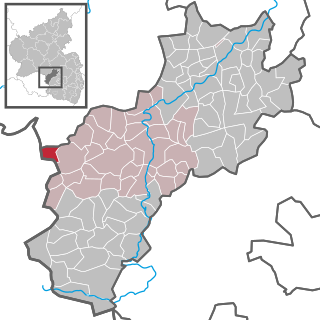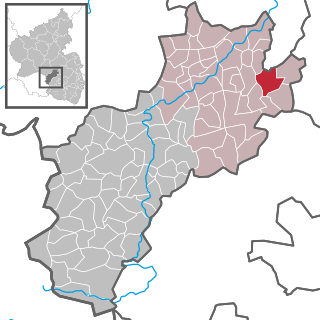
Wolfersheim is a village in the municipality of Blieskastel in the region Bliesgau (Saarland, Germany).

Wolfersheim is a village in the municipality of Blieskastel in the region Bliesgau (Saarland, Germany).
The village is situated on the east hillside of Kalbenberg, right of the river Blies.
The church (its origins date back to the 14th century) is the center of the village. In front of the church is one of the many fountains that can be found throughout the village, all beautifully decorated with stone sculptures. The village has many chestnut and walnut trees and well as mixed orchard grasslands.
On the mountain ridge close to Wolfersheim a group of graves were found that date back from the Hallstatt culture (800 - 500 AD).
Wolfersheim was first documented in 1274 and was a settlement of a Frankish man Wolfhari. The main road of the village is still named after Wolfhari. In the late Middle Ages, the village belonged to the monasteries of Hornbach, Gräfinthal and Wadgassen. Since 1453, Stephen, Count Palatine of Simmern-Zweibrücken became the regent. In 1777 baron Christian Cathcart von Carbiston received the village from Charles II August, Duke of Zweibrücken. But only one year later, the village was sold to countess Marianne von der Leyen in Blieskastel due to financial straits.
The village has a rural character. Many of the old farmhouses from the 19th and 20th century were restored in the last years and therefore the original character of the village could be maintained. The many clubs and the engagement of the resident give Wolfersheim its special character. In 2004, Wolfersheim won the gold medal in a competition called "Unser Dorf soll schöner werden" (Our village shall become more beautiful) on national level.
During World War II, the Protestant (Lutheran) church in Wolfersheim was heavily damaged. After the war, there have been several restorations of the church in 1958–1960, 1974, and most recently in 1996–1997. [1]

The Palatinate, or the Rhenish Palatinate (Rheinpfalz), is a historical region of Germany. Prior to World War II, it was also referred to as Rhenish Bavaria; as a state of the Holy Roman Empire, it was known as the Lower Palatinate (Unterpfalz), which designated only the western part of the Electorate of the Palatinate, as opposed to the Upper Palatinate (Oberpfalz). It occupies roughly the southernmost quarter of the German federal state of Rhineland-Palatinate (Rheinland-Pfalz), covering an area of 2,105 square miles (5,450 km2) with about 1.4 million inhabitants. Its residents are known as Palatines (Pfälzer).

Glan-Münchweiler is an Ortsgemeinde – a municipality belonging to a Verbandsgemeinde, a kind of collective municipality – in the Kusel district in Rhineland-Palatinate, Germany. It belongs to the Verbandsgemeinde of Oberes Glantal.

Blieskastel is a city in the Saarpfalz (Saar-Palatinate) district, in Saarland, Germany which is divided into villages. It is situated on the river Blies, approximately 10 kilometres southwest of Homburg (Saar), 8 km (5 mi) west of Zweibrücken, and 20 km (12 mi) east of Saarbrücken.

Altenkirchen is an Ortsgemeinde – a municipality belonging to a Verbandsgemeinde, a kind of collective municipality – in the Kusel district in Rhineland-Palatinate, Germany. It belongs to the Verbandsgemeinde of Oberes Glantal, whose seat is in Schönenberg-Kübelberg.

Börsborn is an Ortsgemeinde – a municipality belonging to a Verbandsgemeinde, a kind of collective municipality – in the Kusel district in Rhineland-Palatinate, Germany. It belongs to the Verbandsgemeinde of Oberes Glantal.

Breitenbach is an Ortsgemeinde – a municipality belonging to a Verbandsgemeinde, a kind of collective municipality – in the Kusel district in Rhineland-Palatinate, Germany. It belongs to the Verbandsgemeinde of Oberes Glantal. Breitenbach is one of the Kusel district's eight biggest municipalities. It is also the Palatinate's westernmost municipality.

Dunzweiler is an Ortsgemeinde – a municipality belonging to a Verbandsgemeinde, a kind of collective municipality – in the Kusel district in Rhineland-Palatinate, Germany. It belongs to the Verbandsgemeinde of Oberes Glantal.

Gries is an Ortsgemeinde – a municipality belonging to a Verbandsgemeinde, a kind of collective municipality – in the Kusel district in Rhineland-Palatinate, Germany. It belongs to the Verbandsgemeinde of Oberes Glantal, whose seat is in Schönenberg-Kübelberg.

Henschtal is an Ortsgemeinde – a municipality belonging to a Verbandsgemeinde, a kind of collective municipality – in the Kusel district in Rhineland-Palatinate, Germany. It belongs to the Verbandsgemeinde of Oberes Glantal.

Herschweiler-Pettersheim is an Ortsgemeinde – a municipality belonging to a Verbandsgemeinde, a kind of collective municipality – in the Kusel district in Rhineland-Palatinate, Germany. It belongs to the Verbandsgemeinde of Oberes Glantal.

Lohnweiler is an Ortsgemeinde – a municipality belonging to a Verbandsgemeinde, a kind of collective municipality – in the Kusel district in Rhineland-Palatinate, Germany. It belongs to the Verbandsgemeinde Lauterecken-Wolfstein.

Reichweiler is an Ortsgemeinde – a municipality belonging to a Verbandsgemeinde, a kind of collective municipality – in the Kusel district in Rhineland-Palatinate, Germany. It belongs to the Verbandsgemeinde of Kusel-Altenglan, whose seat is in Kusel.

Reipoltskirchen is an Ortsgemeinde – a municipality belonging to a Verbandsgemeinde, a kind of collective municipality – in the Kusel district in Rhineland-Palatinate, Germany. It belongs to the Verbandsgemeinde Lauterecken-Wolfstein.

Steinbach am Glan is an Ortsgemeinde – a municipality belonging to a Verbandsgemeinde, a kind of collective municipality – in the Kusel district in Rhineland-Palatinate, Germany. It belongs to the Verbandsgemeinde Oberes Glantal.

The Pays de Bitche is a natural region located in the Moselle department of the Grand Est region of France. It corresponds to the present French part of the former principality of Zweibrücken-Bitsch and to the part of the Northern Vosges that lies within Lorraine.

Jonas Erikson Sundahl (1678-1762) was a Swedish-born architect who spent most of his working life at and around Zweibrücken in the German Palatinate. Most of his designs were in the then-modern Baroque style.

Bierbach an der Blies is a part (Stadtteil) of Blieskastel, Saarland, Germany. It is part of the Bliesgau and was founded on the right river bank of the Blies. As a consequence of the territorial and administrative reform of 1974 in Saarland, Bierbach ceased to be an independent municipality and became a part of the town of Blieskastel and incorporated within the district Saarpfalz-Kreis of which Homburg is the administrative seat.
The Battle of Biesingen was a battle of the War of the First Coalition on 17 November 1793 at Biesingen, now a district of Blieskastel. It occurred between a Prussian force under General Friedrich Adolf von Kalckreuth and a French one under General Louis-Lazare Hoche, ending in a Prussian victory.

The Holy Cross Chapel also known as the Gnadenkapelle is located on the Han ("Hain") above Blieskastel in Saarland. As a place of pilgrimage, it belongs to the Blieskastel Monastery, built in 1929, and is visited by around 80,000 pilgrims annually. The chapel was built as a place of veneration for a relic of the True Cross, but today it is closely related to the 14th century Pietà "Our Lady with the Arrows". In the list of monuments of the Saarland, the chapel is listed as an individual monument within the ensemble of the monastery complex "Auf dem Han".

Lisa Becker is a German lawyer and politician of The Greens. She has been a member of the city council of Blieskastel since 2014. She unsuccessfully ran for mayor of the town in 2019, and afterwards became first deputy in the city government. She was the Greens' lead candidate for the 2022 Saarland state election.